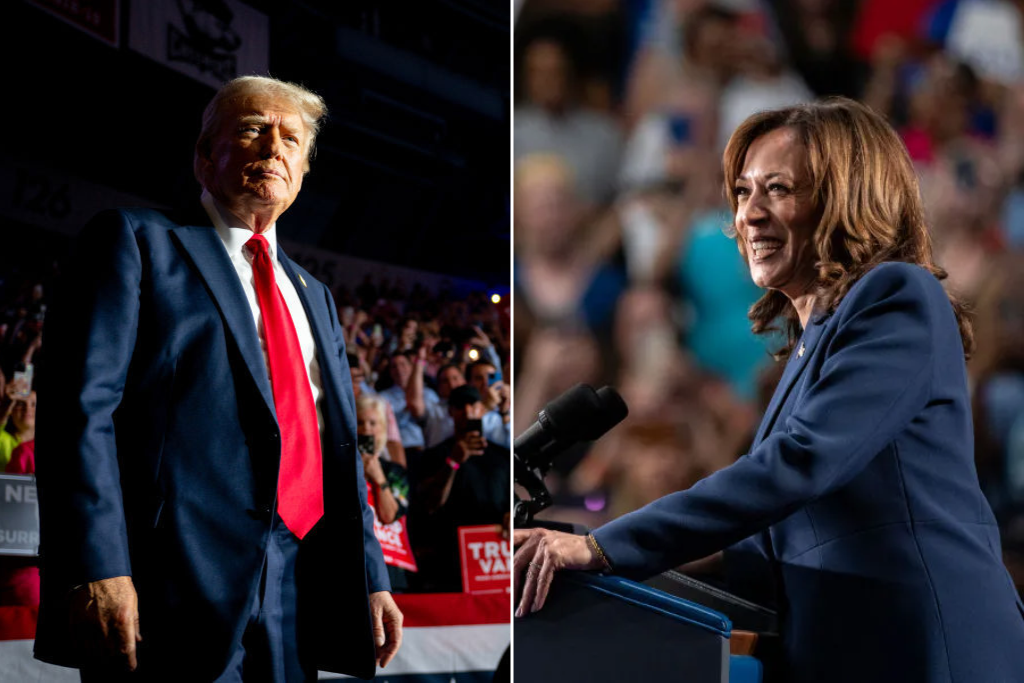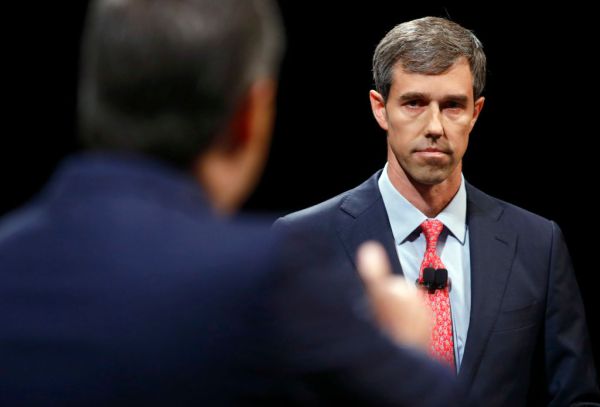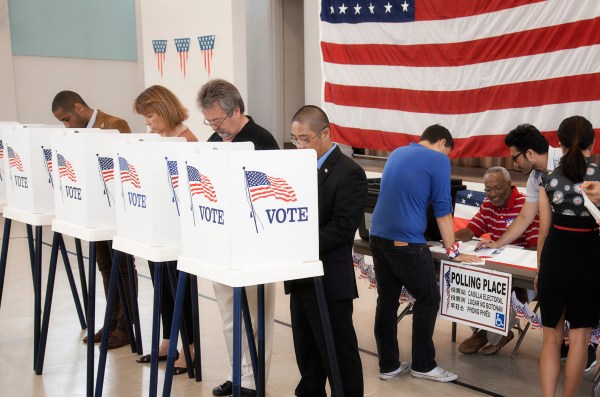Happy Monday! It was a disappointing day for Americans at the U.S. Open yesterday, where—after losing in straight sets to Italian Jannik Sinner—Taylor Fritz missed out on a chance to be the first American man to win the tennis Grand Slam in New York since Andy Roddick in 2003. But at least we got lots of crowd shots of the celebrities in attendance, like Taylor Swift, Travis Kelce, Elon Musk, Matthew McConaughey, and … Sen. Ted Cruz. Ah, that explains it.
Quick Hits: Today’s Top Stories
- A New York judge on Friday delayed the sentencing date in former President Donald Trump’s criminal trial until November 26, three weeks after the 2024 election. “This matter is one that stands alone, in a unique place in this nation’s history,” Judge Juan Merchan wrote, explaining his decision. Merchan also added he would rule on Trump’s appeal—in which the former president’s legal team argued the Supreme Court’s Trump v. United States ruling in July should overturn his felony conviction—a week after the election on November 12.
- Venezuelan political opposition candidate Edmundo González—whom the United States recognizes as the rightful winner of the country’s July 28 presidential election—fled Venezuela on Saturday and arrived in Spain, where he was granted political asylum. Separately, Argentinian officials stated on Saturday that Venezuelan intelligence and security forces had surrounded Argentina’s embassy in Venezuela’s capital city, Caracas, where Venezuelan opposition officials have sought refuge. Argentinian officials warned Venezuelan dictator Nicolás Maduro against “any attempt to interfere or kidnap asylum seekers staying in our official residence.” González’s departure comes one week after a Venezuelan judge issued an arrest warrant for the opposition candidate on unfounded criminal conspiracy charges. Earlier this month, U.S. Secretary of State Antony Blinken said Maduro had “falsely claimed victory, and carried out widespread repression to maintain power.”
- The U.S. Justice Department on Friday charged and arranged for the arrest of Muhammad Shahzeb Khan, a 20-year-old Pakistani citizen residing in Canada, who is accused of plotting a terrorist attack in New York City. Khan, who had posted on an encrypted messaging site in support of ISIS, was planning a shooting meant to specifically target Jewish communities on the one-year anniversary of the Hamas’ October 7 attack on Israel. Khan apparently told an undercover U.S. law enforcement agent he wished to target New York City because it has the “largest Jewish population in America.”
- The Israel Defense Forces (IDF) said on Sunday that a terrorist gunman killed three Israeli civilians at a bridge crossing near the West Bank city of Jericho and Israel’s border with Jordan. The IDF said its security forces killed the shooter—who was identified by Jordan’s Interior Ministry as a Jordanian national—but have not yet determined the perpetrator’s affiliation or motive.
- The U.S. State Department confirmed on Friday that American-Turkish dual citizen Aysenur Eygi was killed Friday near the West Bank town of Beita. Local witnesses have said Israeli security forces had shot Eygi while she was protesting the expansion of Israeli settlements in the West Bank. The IDF, meanwhile, has said only that it is looking into reports of soldiers firing on an “instigator of violent activity” near the protests. “We deplore this tragic loss,” U.S. Secretary of State Antony Blinken said on Friday. “Now the most important thing to do is to gather the facts, and that’s exactly what we’re in the process of doing.”
- Meanwhile, Israeli protesters organized large-scale demonstrations in Tel Aviv and other cities across the country on Saturday night, urging support for a ceasefire and hostage release deal with Hamas. The organizers estimated a total of 500,000 protesters had gathered in Tel Aviv one week after IDF troops located the bodies of six Israeli hostages, who were murdered by Hamas shortly before their discovery in a tunnel beneath Gaza’s southernmost city of Rafah.
- French President Emmanuel Macron on Thursday appointed longtime French politician and diplomat Michel Barnier to serve as the country’s new prime minister, two months after parliamentary elections and former Prime Minister Gabriel Attal’s resignation. The 73-year-old Barnier—who had run a short-lived presidential campaign in 2022—most recently served as the European Union’s top negotiator with the United Kingdom after it voted to leave the EU and, before that, served in various cabinet-level ministerial roles in the French government. France’s National Assembly consists of legislators from the three major political coalitions: the far-left New Popular Front, Macron’s centrist Ensemble, and the far-right National Rally. Barnier’s party, the right-of-center Républicains, came in a distant fourth place in France’s July parliamentary elections, and Barnier will seek to form a governing coalition.
- The Bureau of Labor Statistics reported Friday that U.S. employers added 142,000 non-farm jobs in August, below the Dow Jones consensus forecast of 161,000 but well above the 89,000 jobs added in July. A large share of the job gains came in the construction and health care sectors—which combined to add 65,000 jobs in August, accounting for about 45.8 percent of the month’s total growth. The unemployment rate ticked down from 4.3 percent to 4.2 percent, while average hourly earnings—a measure often predictive of future inflation—rose 0.4 percent month-over-month and 3.8 percent year-over-year.
- A wildfire in San Bernardino County, California, has prompted evacuations in Highland and Running Springs in recent days, with the blaze spanning more than 17,000 acres as of Sunday. The wildfire—dubbed the “Line Fire”—first sparked Friday evening and rapidly expanded over the weekend. The cause of the fire is currently under investigation.

Former President Donald Trump and Vice President Kamala Harris have spent the last two months saying a great deal about each other from afar as they crisscross swing states. The two candidates will finally close that distance at the second—first?—debate of the general election tomorrow night.
It will be the first time the pair has ever met in person.
Seventy-four days since Trump and President Joe Biden took the stage in the June debate that set the 81-year-old Democrat on a path to exiting the race, all eyes will be on Tuesday night’s showdown moderated by ABC News’ David Muir and Linsey Davis at the National Constitution Center in Philadelphia. Election Day is 57 days away, but early voting begins in Pennsylvania—arguably the most important swing state on the map—a week from today. The debate will likely be the last opportunity for either campaign to shift the trajectory of the race before voters start casting ballots.
When Harris took over the Democratic ticket, it wasn’t immediately clear that another debate would happen. Both campaigns spent weeks going back and forth over the format and the rules. The Trump campaign wanted to keep the rules the same as when Biden was running: Both camps had originally agreed to two debates, and during the Trump v. Biden matchup, Democrats succeeded in having the microphones muted for the candidate waiting to speak.
The Democratic position on the mics flipped once they ditched their octogenarian candidate. “Vice President Harris, a former prosecutor, will be fundamentally disadvantaged by this format, which will serve to shield Donald Trump from direct exchanges with the Vice President,” the Harris campaign wrote in a letter to ABC News. “We suspect this is the primary reason for his campaign’s insistence on muted microphones.” Trump has publicly suggested that he’d prefer the mics stay hot, but his team reportedly pushed for them to be muted—likely a tacit acknowledgment that Trump is well-served by some enforced restraint. As with the previous debate, Trump has preemptively attacked the hosting network, calling ABC News “hostile territory” and “as bad as you can be.”
Harris has apparently taken preparation for the debate seriously. She’s reportedly dedicated most of the last week to prep with an adviser who is not just standing in for Trump as practice but attempting to embody the former president’s brash persona. Harris’ allies are hoping she’s able to let Trump’s character come to the fore while emphasizing her forward-looking change agenda—a message that is typically challenging for an incumbent administration to sell. “What I want her to do is make clear to voters that she is focused on them, on their future, and that Trump is focused on himself and on the past, on litigating grievances,” Matt Bennett—an executive vice president of Third Way, a center-left think tank—told TMD.
The Republican strategy appears to be the opposite of “let Trump be Trump,” hoping—as they have, futilely, for much of the campaign so far—that the former president will avoid personal attacks and instead challenge Harris on policy. “We just need to stick to message and stay focused,” Tony Fabrizio, Trump’s campaign pollster, said on a call last week, according to reporting by Semafor.
But as Jonah often notes, experience suggests waiting for Trump to get back on message is like waiting for Godot. Trump spent an hour on Friday holding a press conference after a hearing in the appeal of the civil court ruling that he was liable for sexually abusing columnist E. Jean Carroll in the 1990s. During the rambling public appearance, Trump attacked Carroll—suggesting he couldn’t have assaulted Carroll because “she would not have been the chosen one”—and other women who’ve accused him of sexual assault. He even offered a soliloquy comparing a dress featured in the case to Monica Lewinsky’s infamous blue dress.
On Saturday, he returned to another of his favorite grievances, claiming baselessly yet again that there was widespread fraud during the 2020 presidential election, promising that “those people that CHEATED will be prosecuted to the fullest extent of the Law, which will include long term prison sentences so that this Depravity of Justice does not happen again.”
Most voters’ views of Trump are likely already set at this point, but Harris is still in the process of defining herself—and being defined—as a candidate. She would no doubt like to “turn the page” on the policy liabilities of the Biden administration, namely inflation and immigration, and all the better if Trump’s debate behavior distracts from having to litigate her policy record. “For Harris to succeed, she needs the campaign to be more about Trump’s polarizing behavior and personality and less about the policy contrast between the two candidates on things like inflation and immigration policy,” Amy Walter, editor-in-chief of the Cook Political Report, wrote last week. “What we don’t know, however, is whether Harris can remain on message and focused in an unscripted setting like a debate.”
General election debates rarely affect electoral outcomes, Biden’s June performance notwithstanding. But the tight margin of this election could prove another exception to the “debates don’t matter” thesis. Reading the tea leaves of day-to-day state-level polling changes is a fraught endeavor, but zooming out to the national level shows a race that Harris just barely leads nationally. Harris is ahead of Trump by 2.5 percent, according to Nate Silver’s latest national polling average, though that lead was 3 percent last week.
As our own elections and polling guru, Chris Stirewalt, explained last week, the nature of the electoral college and Democrats’ disproportionate presence in big cities means that Harris needs to win the national vote by at least 2 points to have a shot at securing the White House: Former Secretary of State Hillary Clinton won the popular vote by 2.09 percent in 2016, and Biden won it by 4.46 percent in 2020. If the polls are accurate and Harris can secure a 3- or 4-point national lead, she could be in a position to win.
The race will come down to how many undecided voters break for either Trump or Harris over the next eight weeks. Trump clinched nearly 75 percent of the undecided and protest voters in the closing stretch of the 2020 campaign. “If he closes as strongly as he did in 2020, he can win,” Stirewalt explained on The Remnant last week. But those gains occurred in the context of a Biden campaign that stalled in the final leg of the race. Harris rode a wave of momentum after taking over the top of the ticket, but that may be her last easy win after her coronation at the Democratic National Convention last month. A New York Times/Siena College poll released Sunday had Trump leading 48 percent to Harris’ 47 percent nationally, potentially suggesting Harris’ early boost may be over.
Ultimately, the contest still rests on historically razor-thin margins. As CNN’s Harry Enten noted last week, every presidential election from 1964 to 2020 had at least a three-week period where one candidate was up by at least five points nationally. There hasn’t been a single day in the 2024 campaign—including when Biden was the presumptive nominee—where either side has been up by that much. Nate Cohn, the New York Times’ chief political analyst, said Wednesday that “the polling averages today are closer than the final pre-election polling in any presidential election in the era of modern polling.”
With the race so tight, both campaigns’ resources and tactical decisions could also end up playing an outsized role in the outcome of the election. The Trump campaign has largely outsourced its ground game to allied organizations—namely Turning Point USA, as the Dispatch Politics crew reported last week—but some Republican operatives are skeptical such groups can actually deliver on get-out-the-vote efforts. Meanwhile, the Harris campaign reported raising $361 million in August, almost tripling the Trump campaign’s August donations.
It’s incredibly late in an incredibly close race. We’ll let you know Wednesday morning if the debate has returned to its historical pattern of irrelevance—or potentially shifts the balance of the race.
Worth Your Time
- If everything is an “emergency,” is anything? “Many emergencies, granting vast powers to the president and to executive agencies, are still on the books,” Jack Butler observed in National Review. “This state of affairs has confounded the definition of an emergency: typically, a singular, fixed catastrophe, as well as its direct consequences. Think of a widespread disease; a hurricane and the damage it leaves in its wake; a volcanic eruption; the release of toxic waste. But there are currently 43 active national-emergency declarations. One of them dates back to the Carter administration. Others will turn 30 by the end of this year or over the next few. An extended emergency is something of a contradiction,” Butler wrote. “There are real emergencies. They require the means to confront them. But the temptations of this form of government are obvious. Creative interpretations of both what an emergency is and what the powers one grants might mean could easily do violence to the Constitution by creating shortcuts to action.”
- For Undark Magazine, Paul Bierman recounts the hair-brained Arctic military projects of the Cold War. Project Iceworm, for example, was “a top-secret plan that might represent peak weirdness,” he wrote. “A network of tunnels would crisscross northern Greenland over an area about the size of Alabama. Hundreds of missiles, topped with nuclear warheads, would roll through the tunnels on trains, pop up at firing points, and if needed, respond to Soviet aggression by annihilating many Eastern [Bloc] targets. Greenland was much closer to Europe than North America, allowing a prompt strategic response, and the snow provided cover and blast protection. Iceworm would be a giant under-snow shell game of sorts, which the Army would power using portable nuclear reactors. … But in the end, Iceworm amounted only to a single railcar, 1,300 feet of track, and an abandoned military truck on railroad wheels.”
Presented Without Comment
Former Vice President Dick Cheney, endorsing Vice President Kamala Harris:
In our nation’s 248-year history, there has never been an individual who is a greater threat to our republic than Donald Trump. He tried to steal the last election using lies and violence to keep himself in power after the voters had rejected him. He can never be trusted with power again.
As citizens, we each have a duty to put country above partisanship to defend our Constitution. That is why I will be casting my vote for Vice President Kamala Harris.
Also Presented Without Comment
Former President Donald Trump, on Truth Social:
CEASE & DESIST: I, together with many Attorneys and Legal Scholars, am watching the Sanctity of the 2024 Presidential Election very closely because I know, better than most, the rampant Cheating and Skullduggery that has taken place by the Democrats in the 2020 Presidential Election. It was a Disgrace to our Nation! Therefore, the 2024 Election, where Votes have just started being cast, will be under the closest professional scrutiny and, WHEN I WIN, those people that CHEATED will be prosecuted to the fullest extent of the Law, which will include long term prison sentences so that this Depravity of Justice does not happen again. We cannot let our Country further devolve into a Third World Nation, AND WE WON’T! Please beware that this legal exposure extends to Lawyers, Political Operatives, Donors, Illegal Voters, & Corrupt Election Officials. Those involved in unscrupulous behavior will be sought out, caught, and prosecuted at levels, unfortunately, never seen before in our Country.
In the Zeitgeist
In July, long jumper Tara Davis-Woodhall won gold at the Paris Olympics as her husband, Paralympian Hunter Woodhall, went nuts in the stands. On Friday, Hunter Woodhall joined the gold medal club himself, coming from behind to win the 400-meter race at the Paralympics as Davis watched with obvious glee from those very same stands.
Toeing the Company Line
- Charles is up to bat in September’s Monthly Mailbag (🔒) to answer questions about Michigan sports, covering political conventions for the first time, and being a theater kid. Members can leave their questions in the comments here.
- In the newsletters: The Dispatch Politics team reported on the Republican Jewish Coalition’s support for Trump, Nick observed that (🔒) partisan activists on both sides seem to be prepping for an Election Day defeat, Jonah examined what might have led Tucker Carlson to platform historical revisionism about Nazis, Chris analyzed Democrats’ (🔒) electoral hopes in Texas and Florida, and in Dispatch Faith, Scott Salvato reflected on the “varied expressions” of Catholicism around the world.
- On the podcasts: Jonah ruminated on the role of intellectual and moral corruption in legitimizing dishonorable revisionism, and on today’s episode of The Dispatch Podcast, Jamie interviews Politico’s Jonathan Martin about his recent argument that Republicans need to lose in order to win.
- On the site over the weekend: Kevin traveled to Fargo, North Dakota, to get a taste of the “vanilla” appeal of comedian Nick Bargatze, Luis reviewed Sabrina Carpenter’s latest pop album through a pronatalist lens, and Mustafa Akyol explored what Salman Rushdie’s new book, Knife: Meditations After an Attempted Murder, tells us about reason and religion.
- On the site today: Matthew Lee Anderson seeks to reframe the 2024 abortion debate for pro-lifers.
Let Us Know
If you’re planning to tune in, what will you be listening for in the debate tomorrow night? Could either candidate do anything to change how you plan to vote?












Please note that we at The Dispatch hold ourselves, our work, and our commenters to a higher standard than other places on the internet. We welcome comments that foster genuine debate or discussion—including comments critical of us or our work—but responses that include ad hominem attacks on fellow Dispatch members or are intended to stoke fear and anger may be moderated.
With your membership, you only have the ability to comment on The Morning Dispatch articles. Consider upgrading to join the conversation everywhere.